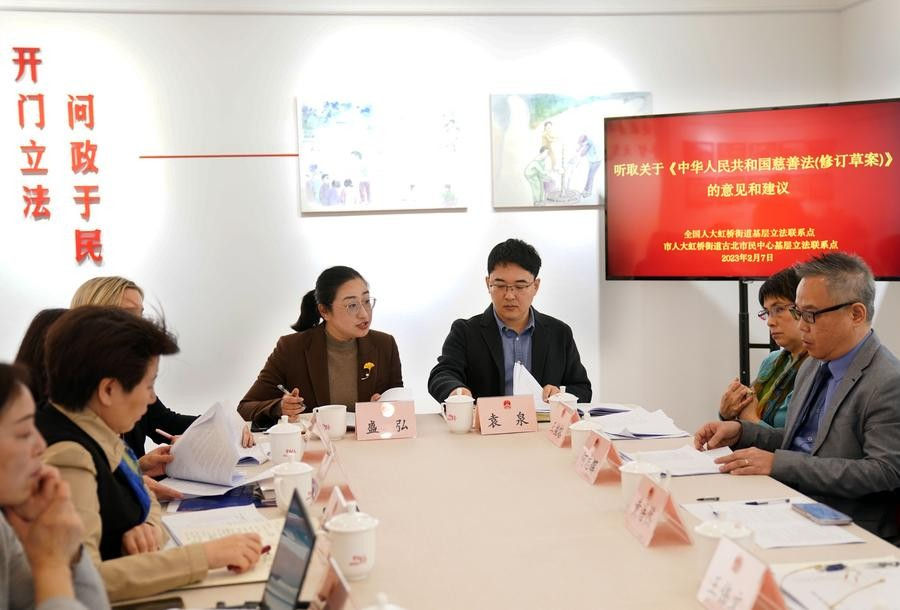
He Xiyue Sheng Hong (4th R), a deputy to the National People's Congress and Party chief of a residential community in the Hongqiao Subdistrict, listens to comments and suggestions of a draft revision to the Charity Law at a civic center in east China's Shanghai, Feb. 7, 2023. (Xinhua/Liu Ying)
BEIJING, Sept. 13 (Xinhua) -- In contrast to Western capitalist systems grappling with the erosion of democracy and chronic failures, China's socialist democracy thrives with vitality in advancing its modernization drive and raising the quality of people's life.
Why so? In the West, democracy often leads to a high degree of polarization and a low sense of common purpose. China's democracy bolsters national cohesion, maintains political unity and stability, and creates excellent synergy in developing the country. It pools the enormous wisdom of the people and serves their interests. It is a true democracy and it works.
This year marks the 70th anniversary of the establishment of the system of people's congresses -- China's fundamental political system that provides the ultimate approach to guaranteeing that the people run the country. It is an essential institutional support for the whole-process people's democracy, which is practiced in democratic elections, consultations, decision-making, management and oversight.
The annual sessions of people's congresses are first held from the grassroots upwards at township, county, city, and provincial levels and then at the highest national level, to take full cognizance of the people's aspirations and report them to upper levels. Many of the motions put forward by deputies have been carefully reviewed and included in state organs' policy decisions.
The deputies to people's congresses come from all walks of life, including rural people, blue-collar workers, and ethnic minority individuals -- groups often underrepresented in Western political systems. These deputies know about the people's needs and the realities of the country well. Through the national deputies, the voices of the people can be heard directly at the Great Hall of the People during the annual national legislative session.
Democracy has long been misinterpreted, and its meaning has been distorted by various countries. The principles of the so-called One Person, One Vote and party competition underlying the Western electoral system have often been touted as the sole criterion for democracy, despite the fact that a few powerful interest groups often control the political system, and money plays a pivotal role in Western politics.
China's democratic system is not static. Continuous innovations in the forms and channels of democracy have broadened participation. The practice of democracy has become an integral part of daily life and work. This is a source of the strong vitality of Chinese democracy.
More ways and institutions are emerging to better incorporate public opinion. Since 2015, national, provincial, and municipal legislative commissions have set up thousands of grassroots outreaches across China, ensuring that grassroots views are considered in legislation. Some 200,000 deputies' centers and liaison offices have been set up nationwide, enabling deputies to listen to people's voices and help them address concerns.
This ensures people's voices are heard, not only through their one-time vote. In eastern China's Fujian Province, for example, rural people can engage with lawmakers and contribute to decision-making freely in tea lounges.
Democracy is not an ornament but an actual instrument for addressing the people's issues. While some Western countries struggle with a widening wealth gap and other serious social problems, China has rapidly improved people's living standards, health, education and infrastructure. Roads, high-speed railways, and internet networks have expanded, providing development opportunities nationwide. Most notably, with a population of 1.4 billion, China has won the most significant battle against poverty in human history, lifting 770 million rural people out of poverty since its reform and opening up in 1978.
After all, democracy should be measured by the well-being and happiness of the people. Chinese democracy promotes sound and efficient national governance while minimizing internal friction.
This is a democracy with distinctive Chinese features. It has not only empowered nearly one-fifth of the world's population to shape their future but has also inspired other countries to explore political systems and development paths that best suit their national conditions.
Reality shows that those who judge other countries by their own yardstick have often resorted to force, armed intervention, and color revolutions to impose their political system and model of democracy on others, leading to numerous humanitarian disasters.
Democracy is a common desire and value for humanity. China has created and developed a whole-process people's democracy in line with its national conditions. But it never seeks to export its model of democracy, just as its philosophical heritage holds that it is only natural for things to be different and promotes harmony without uniformity.
There is always room for improvement in democratic systems. Chinese democracy is also developing, with the country continuing to diversify its forms of democracy at all levels and strengthen the institutions through which the people run the country. Through these efforts, Chinese democracy will demonstrate increased vitality in supporting the national modernization drive.
-
Xi highlights ethnic unity
Xi highlights ethnic unity
-
Leadership sets out priorities for economy
Leadership sets out priorities for economy
-
Xi urges promoting ethnic unity across generations
Xi urges promoting ethnic unity across generations
-
China-ASEAN cooperation hailed at expo
China-ASEAN cooperation hailed at expo